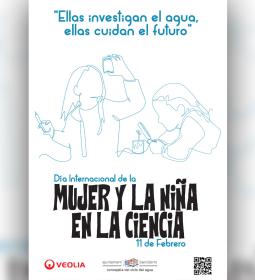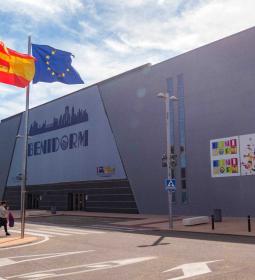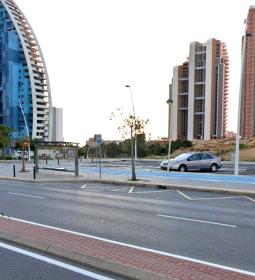The mayor made the announcement during a technical conference held by the University of Alicante's 'Water Chair' and the Provincial Council
Benidorm will approve the agreement for the free transfer of land for the construction of the desalination plant at the next plenary session

The Mayor of Benidorm, Toni Pérez, announced this morning that the City Council will approve, at the next plenary session, the agreement between the council and the Marina Baixa Water Consortium for the free transfer of the land on which the future Benidorm desalination plant will be built. The matter will be decided next Monday during the information committees, as the mayor announced this morning at the opening of the technical conference "Water Security for the Marina Baja, Alicante," organized by the University of Alicante's Water Chair and the Provincial Council, coordinated by the Chair's director, María Inmaculada López Ortiz, and held at the El Torrejó building.
Pérez stated that the City Council "is providing the land and the outfalls" and that the Water Consortium is expected to launch the bidding process this year. According to the plan, the plant's commissioning date is 2028.
On September 23, 2024, the Consortium's General Meeting approved the document envisaging the construction of the desalination plant that will serve the region and the agreement that will be signed shortly. The plant will be designed to produce 3 cubic hectometers per year in the first phase and 6 cubic hectometers in the second, with water quality that will comply with current regulations. The plant's design, as established in the agreement, must consider the possible reuse of existing marine pipelines—the outfalls—or their removal and subsequent treatment. The use of existing seawater pumps will also be analysed, and the design of new ones will be developed if necessary. The plots and facilities adjacent to the former desalination plant belonging to Sociedad de Proyectos para la Transformación Digital S.A. will be transferred to the Consortium in Benidorm, a total of approximately 7,000 square meters.
At today's event, the mayor also stated that the Marina Baixa requires "strategic infrastructure" and a "climate-resilient" approach to ensure medium- and long-term water security throughout the region. Pérez believes that "structural water security" is needed because the tourism model, the urban structure of the region, and agricultural activity "cannot afford the risk of shortages." In this regard, despite the "significant" progress, the mayor warned of the need for a desalination plant, interconnections, and regional planning to be successful.
The mayor highlighted the work of the Water Consortium, Hidraqua, the UA (Urban Water Authority), and administrations such as the Provincial Council and the Generalitat (Catalan Government). Thus, he affirmed that the Consortium's management is "absolutely strategic" and that it is "the backbone of water, economic, and environmental balance." Regarding Dinapsis and Hidraqua, he noted that "it not only operates and manages, but also co-creates solutions with administrations, universities, and startups." Regarding the UA, he noted that it collaborates with the City Council on the digitalisation of the water cycle and participates in projects involving the WWTP, water networks, and the future desalination plant.
He also praised the role of the Provincial Council, which, through direct subsidies, co-financing of works, and participation in programs, "improves essential infrastructure, optimises water resources, and strengthens the city's resilience." Regarding the Generalitat, he cited the recent agreement "to invest 14.5 million in improving the WWTP and EBARs."
Pérez also highlighted the water management model developed in Benidorm, "with an efficiency of 95%, much higher than the 70% average in Spain," and stated that the key to success lies in comprehensive water cycle management, encompassing "efficient collection and distribution, wastewater treatment and reuse, innovation and real-time monitoring, water waste minimization, and desalination as a supporting measure."
Furthermore, he opined that the city not only uses water efficiently but also "promotes the circular economy" through the development of a wastewater reuse system that prevents waste and uses 36% of the treated water to irrigate gardens, parks, and clean streets. Benidorm, Pérez specified, has a Reclaimed Water Master Plan, has made significant progress in creating a distribution network for this type of water, and has already committed to developing the Benidorm Comprehensive Water Footprint Management Plan.
Regarding the Benidorm desalination plant, the mayor emphasised that the City Council "has provided the land and the outfall," so the Consortium hopes to begin bidding this year and that 2028 is the expected date for the plant's commissioning. "Here in Benidorm and the surrounding region, water management is a priority; we apply tenacity and innovation, achieving excellent results," he said. Toni Pérez concluded his speech by stating that "we know that reserves are limited and that we are heading towards a clear dependence on external contributions," and therefore "we are working on the reuse of reclaimed water and the digitalization of water management, the use of groundwater, and maximum collaboration between city councils."
The day then included a panel discussion in which several experts took part. Vicente Mayor, Director of the Engineering Department at Benidorm City Council, spoke about the Master Plan for Promoting the Reuse of Reclaimed Water in Benidorm. Ciriaco Clemente, Concessions Manager at Hidraqua, and Cristina Baixauli, Director of Transformation at Hidraqua, spoke about digitalisation as a key factor in ensuring water security in the Marina Baixa. Jaume Berenguer, Technical Director of the Water Consortium, spoke about water security in the region through the Consortium's water management model. Miguel Fernández Mejuto, Head of the Water Technologies Unit of the Provincial Council's Water Cycle Department, also spoke about the role of groundwater in the water sustainability of the Marina Baixa. Finally, Andrés Molina, Director of the Institute of Water and Environmental Sciences at the UA, addressed the new legal framework for reclaimed water.








